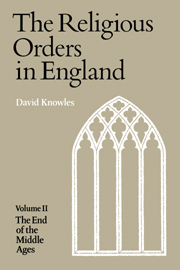Book contents
- Frontmatter
- Contents
- Preface
- List of Abbreviations
- Part One The Historical Framework
- Part Two The Institutional Background
- Chap. XVII Recruitment, employment and the horarium
- Chap. XVIII The wage-system and the common life
- Chap. XIX The election and privileges of the superior
- Chap. XX The numbers of the religious
- Chap. XXI Literary work
- Chap. XXII The monasteries and society
- Chap. XXIII Vicarages, the cure of souls and schools
- Chap. XXIV Public obligations of heads of houses
- Chap. XXV The monastic economy, 1320–1480
- Chap. XXVI Monastic Libraries
- Chap. XXVII Retrospect
- Appendix I Chaucer's monk
- Appendix II Henry V and the Westminster recluse
- Appendix III Regulars as bishops
- Bibliography
- Index
Chap. XIX - The election and privileges of the superior
Published online by Cambridge University Press: 28 January 2010
- Frontmatter
- Contents
- Preface
- List of Abbreviations
- Part One The Historical Framework
- Part Two The Institutional Background
- Chap. XVII Recruitment, employment and the horarium
- Chap. XVIII The wage-system and the common life
- Chap. XIX The election and privileges of the superior
- Chap. XX The numbers of the religious
- Chap. XXI Literary work
- Chap. XXII The monasteries and society
- Chap. XXIII Vicarages, the cure of souls and schools
- Chap. XXIV Public obligations of heads of houses
- Chap. XXV The monastic economy, 1320–1480
- Chap. XXVI Monastic Libraries
- Chap. XXVII Retrospect
- Appendix I Chaucer's monk
- Appendix II Henry V and the Westminster recluse
- Appendix III Regulars as bishops
- Bibliography
- Index
Summary
Throughout the fourteenth and fifteenth centuries the normal way by which an abbot or prior with jurisdiction attained office was that of free election by all the professed members of his community. The organs of national government and the relative importance of the black monk abbots in the life of the country had changed profoundly since the days when, in the century and more after the Conquest, the abbots had rivalled the bishops in influence at meetings of the Great Council, and the king had often by direct or indirect action appointed the great feudal abbots. Now, save for an occasional attempt at influencing the choice of a persona grata at such a house as Westminster, he no longer concerned himself with the election, though he jealously guarded all the rights connected with a change of abbots.
In any consideration of elections in general, a number of large orders, and several small groups, must be isolated from the rest. To begin with, the Cistercians, Premonstratensians, Gilbertines, Carthusians and a few other fully developed ‘orders’ followed precise regulations of their own, with which no external authority interfered. Very few records of their elections have survived, but it is certain that almost all proceeded without incident, according to their rule as modified by canonical legislation, as purely domestic affairs, normally guided by a visiting superior.
Among the black monks two groups stand in some respects apart.
- Type
- Chapter
- Information
- Religious Orders Vol 2 , pp. 248 - 254Publisher: Cambridge University PressPrint publication year: 1979



